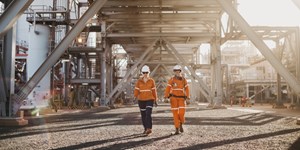Australian LNG workers talk September strike date as Woodside bargaining continues
(Bloomberg) – Workers at one of Australia’s key liquefied natural gas (LNG) facilities will take strike action if they cannot reach an agreement with Woodside Energy Group Ltd. by Wednesday, in the latest escalation over pay and conditions.
The Offshore Alliance, a group representing two major labor unions, said in a social media post Sunday workers had “unanimously endorsed” giving Woodside seven working days to take industrial action if enterprise bargaining claims “are not resolved” by close of business Wednesday, when Woodside and officials representing workers intend to hold new talks.
If a notice is issued, strike action could begin as early as Sept. 2, the alliance said in a statement Sunday. Workers’ groups are required to give seven days’ notice before industrial action begins.
Woodside said last week that it continues to “engage actively and constructively in the bargaining process” and that “positive progress is being made.” A spokeswoman for the company said Sunday that the situation was unchanged from that statement.
Unions have been locked in discussions with Woodside Energy over demands around pay and other conditions by staff at offshore platforms that feed the North West Shelf LNG export facility in Western Australia.
The threat of strikes in Australia has rocked the global gas market, sending prices higher in Europe and Asia over the last few weeks. LNG buyers are holding back purchases and requesting looser delivery terms to avoid any potential impact.
In a ballot earlier this month, about 150 Woodside workers voted for potential action that would include stoppages of between 30 minutes and four hours, and actions such as refusing to unload cargo other than food, water or medical supplies. They would also stop restarting gas compressors or generators, and wouldn’t facilitate helicopter landings.
Workers at Chevron Corp.’s key LNG plants in Australia began voting on industrial action on Friday. Outages at Woodside and Chevron sites could put as much as 10% of global LNG supply in jeopardy, according to Goldman Sachs Group Inc.



